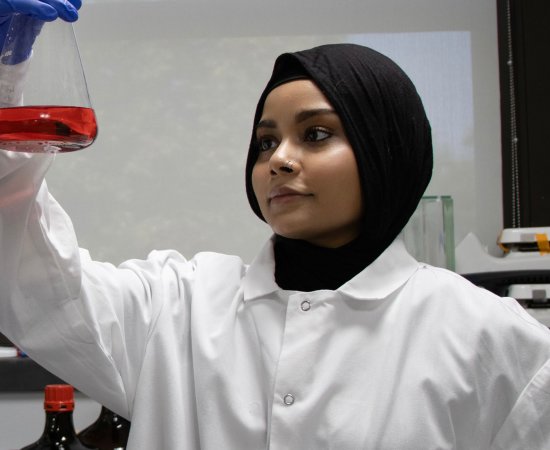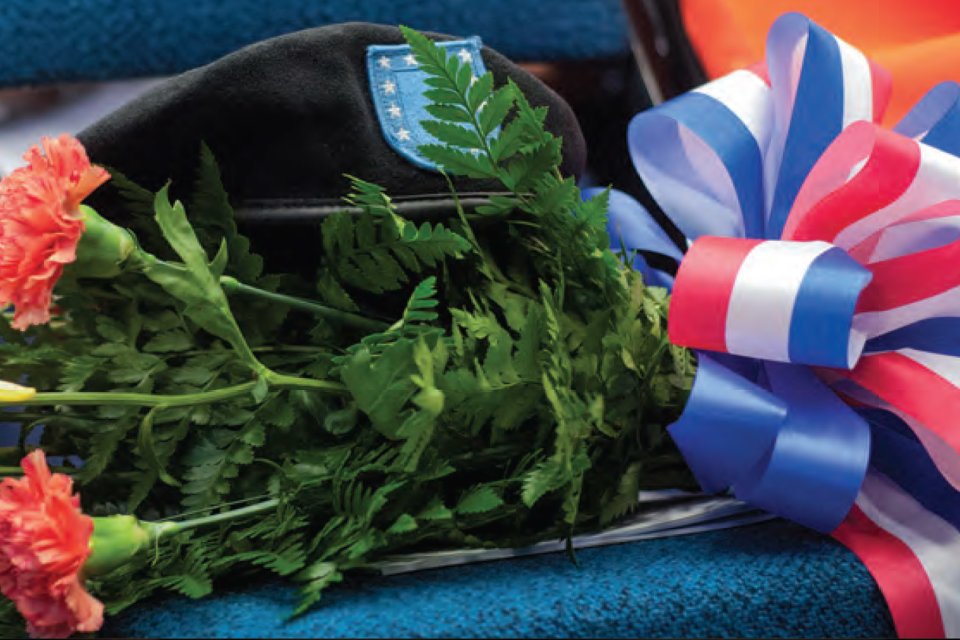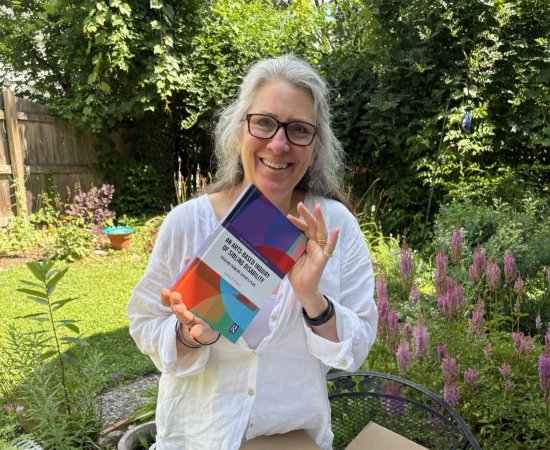
An Exceptional Fight

In a powerful memoir, Barbara Chubback details the extraordinary way her son, Joseph Michael Chubback ’14, fought the hardest battle of his life.
In late 2011, Joseph Chubback was a typical 20-year-old from Rome, N.Y., studying at Utica College. Joey, as he was known to family and friends, was an energetic, ambitious student majoring in physics with a minor in math. He was also a member of the Army National Guard; Joey had spent the summer of 2011 at boot camp in Fort Jackson, South Carolina. His ultimate goal was to put his UC degree to use in a career with the government, perhaps in the CIA or in military research.
But the Chubback family’s world was turned upside down in early 2012, when Joey was diagnosed with a rare cancer, a type of sarcoma known as DSRCT. The following 16 months were a blur of surgeries, chemotherapy, travel, and long hospital stays. Early in the journey, Joey’s mother, Barbara, began to channel her emotions into a diary. In her writing, Barbara chronicled every step of Joey’s battle, including the small moments that revealed Joey’s courage, humor, and strength. The result is Strength Beyond Measure, a 152-page memoir published in April 2015. The powerful, emotional book is excerpted (in italics) below:
The Diagnosis
It began in January 2012: Joey was home for the winter break when he started experiencing strange symptoms—night sweats, loss of appetite, and extreme fatigue—all unusual for the physically fit 21-year-old. At his mother’s urging, Joey made an appointment with his family doctor, who quickly diagnosed him with appendicitis. Joey was rushed into the operating room for an emergency appendectomy, while Barbara, his dad, Joe, and older sister, Alicia, waited for updates.
After Joey was taken into surgery, we paced back and forth in the waiting room. In less than fifteen minutes, the surgeon came to see us. His facial expression told us all we needed to know. Joey’s abdomen was full of cancer. The cancer had wrapped itself around the appendix resulting in appendicitis. The surgeon was able to remove the appendix and retrieve several sizeable biopsies. We quizzed him—had he ever seen anything like this before? What type of cancer was it? Was it treatable?—He told us he had seen this type of cancer before, but not in someone Joey’s age. He said, “I’m sorry, but his prognosis isn’t good.”
Just over a week later, after several tests, Joey and his parents met with an oncologist, who gave them more grim news: Joey’s cancer was very rare and advanced. It would likely end his life within a year. Heartbroken but determined, Barbara researched treatments online and learned of a new type of surgery that, when combined with chemotherapy, had helped others with DSRCT achieve remission. At the suggestion of a local specialist, Barbara and Joey traveled to the UPMC-Passavant hospital in Pittsburgh for the surgery. During the procedure, the doctor discovered that the tumor in Joey’s abdomen had spread more than the CT scan had revealed. In an effort to stop the cancer’s growth, the doctor removed Joey’s spleen and large sections of his small intestine, liver, and rectum. The news devastated Joey’s family, who knew his quality of life would decline significantly, even if he was able to beat the cancer. Meanwhile, the 12-hour surgery left Joey weak; he required a ventilator to breathe and was sent to the ICU to recover.
Nothing prepares a parent for seeing their child in ICU, let alone on a ventilator. Looking down at my son, I was overcome by how frail he looked. I lifted one of his hands and placed it in mine. Alicia stood across from me, gently rubbing the top of Joey’s other hand with her fingers. We both struggled to maintain our composure. Joe took one look at Joey and walked past him to the window. He stood there a few moments before returning to Joey’s side. Brandon stood at the foot of the bed. The reality of what Joey was going through was apparent to us. How could Joey be in this position? Just a few months ago, he was at the top of his game, on the verge of making his mark in the world. Now, he was fighting for his life.
Joey faced several complications after surgery, including a blood clot in one of his lungs. His recovery was long and grueling. After nearly a week in Pittsburgh, Joey’s dad and sister returned home, leaving Barbara alone with her son for over a month. She rarely left Joey’s bedside as he fought to regain the strength to travel.
Joey and I created a lifetime of memories in the weeks we spent together. We talked about life, faith, his childhood, the future, and his cancer. Some days I couldn’t fathom what the future held for him. I seemed to have a constant ache in my heart. I said a Novena to the Blessed Mother twice a day. Every night, before bed, I would say the rosary. I was scared. I knew the road ahead was going to be long and difficult. Joey had endured so much already and he still had to endure aggressive chemotherapy.
Surviving “The Red Death”
Joey’s doctors in Pittsburgh recommended six courses of rigorous chemo, a regimen nicknamed “The Red Death” for its devastating side effects. From his first round in August 2012, Joey experienced constant nausea and pain, leaving him confined to his hospital bed in Pittsburgh. But by late November, he was well enough to return home for Thanksgiving.
Once, during his chemo treatments, I asked Joey why he would stare at me so much. I would wake up some nights in his hospital room to find him looking over at me. He told me he was making memories, mental snapshots, to keep in case he didn’t make it. Now, on Thanksgiving, I was the one making memories. I kept watching Joey as I thought, “Will this be the last Thanksgiving with my son?”
The following weeks were wrought with complications. The chemo had ravaged Joey’s body, leaving him visibly emaciated and weak. At home on New Year’s Eve 2012, Joey started experiencing intense abdominal pain and began to vomit. Barbara called his doctor, who told her to rush him to Pittsburgh as quickly as possible. In Pittsburgh, Joey underwent yet another surgery --- this time to remove a blockage in his intestine. During the surgery, the doctor found more adhesions than expected, a sign that the cancer had stopped responding to the chemo. The doctor delivered some difficult news to Joey’s parents: Joey didn’t have much time left. As Barbara, Joe, and Alicia processed the information, Barbara found herself alone with Joey, faced with the task of sharing the heartbreaking news with her son.
After Joey stabilized, Joe and Alicia left to get breakfast. As soon as they left, Joey motioned for me to come closer. When we he was a little boy, he would pull my face to his with both his hands, and look deep into my eyes. He did exactly that as he softly said, “What’s wrong, Mother? What are you scared of?” My eyes filled with tears as I replied, “Don’t do this to me, Joey. Please don’t.” He told me it would be okay, no matter what it was. “Tell me about my surgery, Beautiful. It’s OK, I need to know.” I proceeded to tell him the news. He listened intently, gazed down at his lap, and through tear-filled eyes said, “Is that all there is, Mom? My candle will go out at twenty one… my life will be over?” Then, we cried. After a few minutes, he sighed and said, “Look at it this way, Mama. I will be with Grandpa. I will come to meet you when it’s your time.”
Finding Comfort
Despite continuing chemo, Joey’s health worsened. Finally, after accepting that further treatment was futile, Joey asked his doctors if he could return home to say his final goodbyes. He was assigned a palliative pain team, and hospice workers helped prepare the family home in Rome for his return. A hospital bed was set up in the living room, along with other medical supplies. Friends and family visited, and Joey spoke with them privately, giving each person an item that had special meaning. Yet, despite his condition, Joey had an important errand to run: He needed to rent a tuxedo. Months earlier, Joey’s childhood friends Kyle and Rachel had asked him to be a groomsmen in their wedding on August 3, 2013. Joey had promised to attend, so on July 12, three days after returning home to live out his final days, Joey and Barbara went to the men’s clothing store.
The day of the fitting Joey had all he could do to get up and get into his wheelchair, but he did it. The woman measuring him was noticeably touched by his determination and simultaneously overwhelmed by his frailty. She tried her best to hide her pity as she measured him. But I think she almost lost when he said, “Can I look at brown tuxes? I would like one for my funeral.” Leave it to Joey. He selected a traditional tuxedo in chocolate brown with a light beige textured vest and tie. He also picked out a pair of new shoes. Not too many people could do such a thing, but Joey was not your typical person. We had all come to know this by now.
Later, Joey accomplished another seemingly incomprehensible task: He chose his own headstone, a statue of St. Michael the Archangel made of gray granite. As Joey’s body deteriorated, he accepted that he was too weak to attend his friends’ wedding. He told his mother that instead, he would be there in spirit. So on July 29, at Joey’s request, the doctors increased his pain medication and discontinued the IV drip, his only form of nutrition, the final preparations in the dying process. While they were overcome with anguish and grief, Joey’s family was in also in awe: Joey seemed calm and content. He laughed and joked when he could. He greeted his mother each morning with, “Hello, Beautiful!” More than anyone else, Joey was the one who helped his family cope.
Joey was lying in bed when his Dad came in to give him a hug. Joey said, “Are you alright, Dad?” As he hugged Joey, Joe shook his head and began to cry. “This just isn’t fair. This shouldn’t have happened to you at such a young age when you had so many dreams and plans ahead of you. I will never understand why this had to happen. I’m sorry I couldn’t protect you, Joey.” Joey said, “This is not your fault, Dad. You did all you could. It’s all part of God’s plan. A plan I don’t understand now, but I will when I pass away.”
Peace, At Last
On August 1, at 3 o’clock in the afternoon, Joseph Michael Chubbuck passed away. He was surrounded by his family in the home where he grew up. Seconds after Joey took his last breath, sunlight filled the Chubbuck family’s living room. A sign, Barbara remembers thinking, that her son was finally at peace.
Joey’s friends Kyle and Rachel were married two days later. A photo of Joey was placed on a small table next to the groomsmen, where Joey would have stood, and at the head table at the reception. Joey’s picture appeared in nearly every photo taken that day. Just as he wanted, he was truly there in spirit.
In spring 2014, almost a year after Joey’s death, Barbara was surprised to receive a package in the mail from Utica College. In it, a letter from President Todd Hutton explained that Joey would be posthumously honored with his Bachelor of Science Degree at that year’s commencement ceremony. So in May 2014, in the Utica Memorial Auditorium, Barbara and Joe watched as Joey’s military beret was placed in a chair next to his fellow graduates, and a visibly choked-up President Hutton shared Joey’s story from behind the podium. “I tell you [Joey’s] story not to make you said,” Hutton told the crowd. “But to inspire you. Joe Chubback reached for what he thought was impossible. And from this day forward, he will be recognized as a UC graduate.”
The Joseph Michael Chubback Foundation
When Joey was a patient Pittsburgh, he talked with Barbara about his desire to start a charity. He told his mother how her presence was a constant comfort to him during treatment, and how he wanted to help others stay close to their loved ones while undergoing chemotherapy, too. Joey’s initial goal was to provide cots for hospital rooms, along with accommodations near treatment centers, where family members could be comfortable and feel at home. Today, more than two years since Joey has passed, his legacy lives on in exactly the way he imagined.
Formed in November 2014, the Joseph Michael Chubbuck Foundation provides financial assistance for needs not covered by insurance to patients and their loved ones, allowing families to stay together and be comfortable during treatment. The Foundation also provides information about top cancer treatment centers along with questions patients and their family should ask when first consulting an oncologist.
To learn more or to donate, visit thejmcf.org or call 315-339-5593.
More Stories


Big little sister

Local Organizations Give to Utica University’s Tangerine Group Food Pantry
I would like to see logins and resources for:
For a general list of frequently used logins, you can also visit our logins page.
